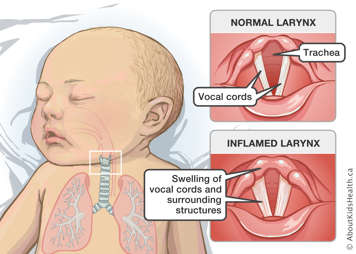What is croup?
Croup is a common childhood illness that is caused by a viral infection. The virus causes swelling in the upper airways, including the larynx (the upper airway between the throat and the trachea) and the trachea (the windpipe or airway passage from the larynx to the lungs).
The swelling can cause changes in your child’s voice and make breathing difficult. Your child may develop a hoarse voice, barky cough or a high-pitched wheezing sound when they breathe in. This sound is called stridor. This is especially likely in younger children, because their airways are smaller.

Signs and symptoms of croup
Croup usually begins like a regular cold, with nasal congestion and dry cough. Sometimes children also have fever. Usually by day two or three, the cough becomes barky, the voice becomes hoarse and children can develop noisy breathing called stridor. Stridor is a high-pitched noise that occurs when breathing in through narrowed airways. In mild croup, your child may have stridor only when crying or coughing. If croup gets worse, your child may also have stridor when relaxed or sleeping and may have trouble breathing.
Other symptoms of croup include:
- harsh barky cough
- noisy breathing (stridor)
- trouble breathing
- hoarse voice
- mild sore throat
- runny or stuffy nose
- fever
Croup usually lasts for about one week
The viruses that cause croup usually last about one week. The barky cough and noisy breathing are usually worse during the first two or three days, and often worse at night.
How did my child get croup?
Croup is caused by viruses that spread easily from person to person. These viruses are spread when a sick person coughs or sneezes.
What can health-care providers do for croup?
Steroid medicine
Your child's health-care provider may prescribe a steroid medicine called dexamethasone to be taken by mouth. This medicine works to reduce the swelling in the airways and to reduce stridor. It takes a few hours for the steroid medicine to work fully, and the effect lasts for 24 to 36 hours. Usually, only one or two doses are needed.
Epinephrine
In the Emergency Department, if your child is having severe problems breathing, your child may be given a medicine called epinephrine. This is given with a mask that sprays epinephrine into your child's airways. This medicine will reduce the swelling in your child's airways very quickly. The effect lasts for about four hours. After four hours, the swelling may come back, and your child may have problems breathing again. If epinephrine is needed, the health-care team will want your child to stay in hospital for four to six hours or until their symptoms improve.
Croup can spread easily
The viruses that cause croup are spread easily from one person to another, especially during the first few days. Keep your child home from daycare or school until the fever is gone and the barky cough has gone away. Keep your child away from young babies (under two months old) as much as you can.
Adults can become infected with the same virus that caused their child's croup. However, adults and older children have larger airways, and the illness is usually mild and can seem more like a cold.
Taking care of your child at home
For most children, croup is a mild illness that can be managed at home. Here are some ways to help your child feel better:
Cool mist
Cool, humid air may help reduce the swelling in the airways that is causing the noisy or difficult breathing. Placing your child near a cool mist vaporizer is ideal. If you do not have a cool mist vaporizer, even a simple humidifier in your child’s bedroom may be helpful. During the winter, you can open your child’s bedroom window to let in some cool air or take your child outside for a short time to breathe in the cool night air.
Steamy bathroom
You can try running a hot shower with the bathroom door closed and the fan off, so the bathroom fills with steam. Sit with your child in the steam-filled bathroom for at least 10 minutes.
Fever and pain medicines
You can treat fever or sore throat with acetaminophen or ibuprofen.
Helping your child's cough
Cough is a symptom of croup. Cough medicines should not be given to children less than 6 years old. The cough will get better as the virus runs its course.
However, the viruses that cause croup can also trigger wheezing in children with asthma and can sometimes cause a chest infection. Take your child to their health-care provider if your child’s cough seems severe, or if your child is having difficulty breathing or is working hard to breathe.
Children with croup can suddenly start to have trouble breathing, and this can happen more than once. While your child has croup, you may wish to sleep in the same room. This will let you know about any problems during the night.
When to see a health-care provider
Call your child's health-care provider if:
- the fever lasts more than three days
- the cough lasts more than one week
- your child is having noisy breathing
- your child complains of an earache
Take your child to the nearest Emergency Department or call 911 if:
- the cool mist does not clear up the stridor in 15 minutes
- your child has repeated episodes of stridor or trouble breathing
- your child's chest or stomach is pulling in while breathing
- your child's lips look blue or purple
- your child starts drooling, has difficulty swallowing or refuses to drink
- your child has neck pain or neck stiffness
- your child seems lethargic (very sleepy) or irritable (very cranky)
- your child is showing signs of dehydration
Your child may show physical changes when their condition is serious or when their condition gets worse. Parents and caregivers can learn how to spot these signs in order to seek help from a health-care provider.
